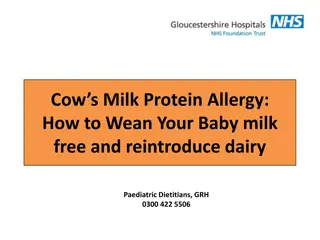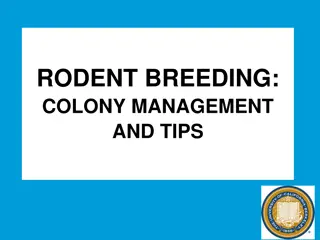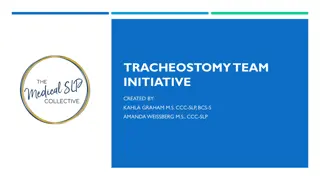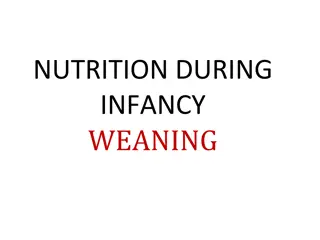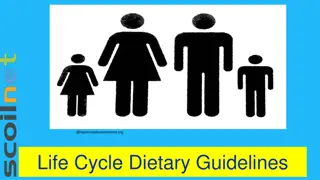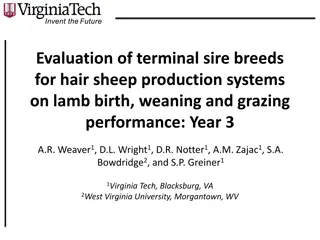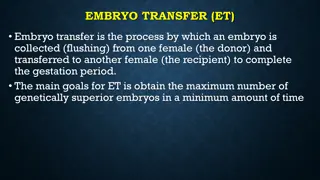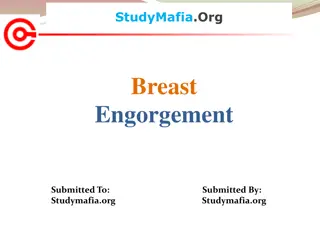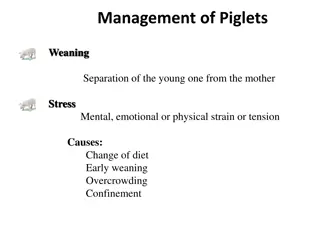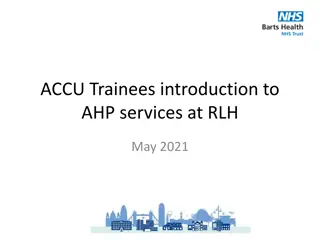Managing Cows Milk Protein Allergy (CMPA) in Infants: Weaning and Reintroduction Guidelines
Cows Milk Protein Allergy (CMPA) in infants can present various symptoms and challenges. This guide covers the diagnosis, symptoms, weaning strategies, reintroduction of dairy, alternative products, and meeting nutritional needs. Learn to differentiate between CMPA and lactose intolerance for proper
1 views • 31 slides
Guide to Efficient Rodent Breeding and Colony Management
This comprehensive guide covers essential aspects of rodent breeding, colony management, and tips for successful rodent reproduction. It includes details on weaning, retiring breeders, records management, problem-solving, resources, goals and planning, breeding systems, reproduction processes, genot
4 views • 35 slides
Understanding Expected Progeny Differences (EPDs) in Beef Cattle Selection
Expected Progeny Differences (EPDs) in beef cattle breeding predict future offspring performance based on genetic merit. They help compare animals as parents and aid in selecting for traits like birth weight, weaning weight, and yearling weight. Combining EPDs with visual appraisal improves decision
0 views • 15 slides
Tracheostomy Team Initiative & Management Inconsistencies
Tracheostomy team initiatives, led by experienced professionals, play a crucial role in delivering coordinated and effective care for patients with tracheostomies. A multidisciplinary tracheostomy team creates a supportive environment, collaborates on weaning procedures, and educates staff and patie
0 views • 25 slides
Development of Tracheostomy Care Bundle: Enhancing Patient Care at Beaumont Hospital
Beaumont Neuro Benchmarking Group established in 2020 to improve tracheostomy management. Audited care, identified inconsistencies, and developed a care bundle for standardized practice. Key benefits include tick box documentation, numerical scoring, and a weaning plan. Successful pilot trial on two
0 views • 4 slides
Guide to Planning Balanced Diets for All Age Groups
Learn about the importance of balanced diets, nutritional needs for different age groups, and how to plan balanced menus using the food pyramid. Discover tips for weaning babies onto solid foods, including the introduction of iron-rich cereals and vitamin C sources. Ensure babies' diets are free fro
0 views • 39 slides
Nutrition Guidelines for Weaning Infants
When introducing solid foods to infants starting at six months, it is important to remember that breastmilk remains a vital part of their diet. Weaning helps in the development of the infant's intestinal tract and the ability to digest proteins, fats, and carbohydrates. However, weaning too early or
0 views • 55 slides
Addressing the Opioid Crisis: A Comprehensive Approach to Pain Management
Firefighters and EMTs now carry Narcan to combat opioid overdose, while a clinical perspective reveals challenges in pain management for over 5,000 patients. Issues include inadequate training in pain medicine, leading to unnecessary opioid prescriptions and lack of proper care plans. A solution inv
0 views • 34 slides
Nutrition Guidelines for a Healthy Life Cycle
Explore the essential aspects of maintaining a healthy lifestyle through balanced diets and proper nutrition at different life stages, such as pregnancy, infancy, childhood, and adolescence. Learn about key skills like understanding energy balance, meal portioning, and nutrient-rich food choices. Di
0 views • 15 slides
Journey of Beef from Farm to Fork
Beef production involves a process starting from cattle farms where cows give birth to calves, followed by the growth stages including nursing, weaning, auction, grazing, feeding in feedyards, and eventually harvesting in processing facilities. The final beef cuts are distributed to supermarkets and
0 views • 11 slides
Evaluation of Terminal Sire Breeds for Hair Sheep Production Systems: Year 3 Study
This study evaluates the efficacy of terminal sire breeds in hair sheep production systems to produce high-value market lambs focusing on survivability, growth, and parasite resistance. The research involves purebred Katahdin, Suffolk, and Texel sires, with a particular emphasis on grazing performan
0 views • 27 slides
Embryo Transfer in Cattle: Benefits, Process, and Considerations
Embryo transfer (ET) in cattle allows for the production of genetically superior offspring, increasing milk production and weaning weights. While offering advantages like rapid genetic improvement and flexibility in genetics transfer, ET also presents challenges such as increased costs and disease r
0 views • 20 slides
Understanding Breast Engorgement: Causes, Relief, and Complications
Breast engorgement is a common condition where breasts become hard, swollen, and painful due to excess milk accumulation. It can be uncomfortable but can be managed through various methods. Causes include schedule changes, overabundant milk supply, and weaning. Relief methods such as frequent breast
0 views • 24 slides
Managing Noninvasive Ventilation Weaning Process
Discontinuing noninvasive ventilation in patients with acute respiratory failure involves a gradual process of assessing the condition, monitoring for distress signs, and adjusting ventilator assistance accordingly. Successful weaning depends on the reversibility of the underlying respiratory issue.
0 views • 28 slides
Managing Piglet Weaning Stress and Farrowing for Better Health
Piglet weaning stress and separation from the mother can lead to various physical and mental challenges, affecting their immunity and overall well-being. Proper management practices during farrowing and weaning can help reduce stress, improve outcomes, and promote healthy piglet growth. Understandin
0 views • 11 slides
Introduction to AHP Services at Royal London Hospital (May 2021)
Physiotherapy services at the Royal London Hospital's ACCU focus on respiratory priorities, tracheostomy and vent weaning, rehabilitation interventions, and early mobilization. The ACCU Physiotherapy Pods, led by Sally Kalsi and Musie Tsehaye, play a crucial role in patient care coordination. Main r
0 views • 28 slides
